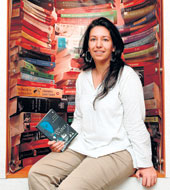 |
| Devyani Saltzman |
Devyani Saltzman has written a book that works at more than one level. It’s centred around the shooting of the award-winning and controversial movie Water and the ups and downs that it went through over five long years. But, more importantly, it’s about how a mother and daughter came together during the shooting. Ordinarily, mothers and daughters don’t need a film set to come together, but this was no ordinary duo: her mother is moviemaker Deepa Mehta. And Saltzman’s relations with her mother had been strained for years. At the age of 11, Devyani had chosen to live with her father in the wake of a painful divorce.
That’s the backdrop to Saltzman’s Shooting Water: A Mother-Daughter Journey and Making of a Film. It’s a debut book for the 26-year-old who skilfully balances the thread of her personal life with the movie and the wider world around.
So, Saltzman writes about her troubled relationship with her mother. But the book also captures life behind the screens when Water was being shot and how shooting had to be stopped when fundamentalists burnt down the sets in Varanasi. Finally, Saltzman recounts how the movie was made in Sri Lanka and how by that time, she and her mother had reached a deeper understanding.
Says Saltzman, “The most difficult passages were the emotional passages. As opposed to being an Oprah confessional, I balanced it out with politics and journalism. If it would have been just the emotional story, I would have been sick of myself. But it has freed us as a family and allowed me to work on this novel and continue to do freelance writing.”
Published by Penguin, Saltzman’s book has already been released in Canada. “It was released in autumn. Since then I have been busy with book tours. There was a big launch in New York too in April,” says the author as she sips on her coffee and talks about the various readings she has done in festivals such as the Canadian Book Festival and the LA Times Book Festival.
“I was reading to multicultural communities. It was very interesting because it was a first time for me. At one of these sessions, an Indo-Canadian man refused to believe that what I had written about widows had actually taken place. He was insistent that it could have happened only 200 years ago. So I feel that India should look at other aspects of its own culture and focus not only on its strengths but weaknesses as well,” points out Saltzman.
As the shoot of Water finished in Colombo in 2004, she got into talks with a publisher in Toronto. The publisher bought the book based on the first three chapters. But she wanted no distractions while penning it down as she was dealing with history. “Be it my family history or the history of Hindutva, I needed a blank space,” she explains.
So she took off to a place she was completely unfamiliar with — Central Mexico — where she rented an apartment. “I barely spoke Spanish. I was staying in a simple room where I could wake up, set up my computer and write. Everyday I wrote till I had 280 pages,” says Saltzman.
While she is in the country, she plans to visit the north-eastern part of India to research her next novel, which she says is on the conflict-ridden region. Saltzman confesses that she has no inclination towards a stint behind the camera.
Since her father is a documentary filmmaker and mother, a director, she grew up on film and television sets. So it would not really have been an unusual choice. “The love for reading and writing has been passed onto me by my mother. So you have a daughter who creates what she loves — reading. And she makes something that I love watching. We each have our own space,” says the 26- year-old who studied sociology and anthropology at Oxford.
Nowadays, she is sharing a house with her mother and stepfather, film producer David Hamilton, in downtown Toronto. The fact that she chose to stay with her father following the divorce had always irked her mother. She says, “It was a painful divorce and I was very alone. It was not until my mother asked me in Colombo why I had not chosen her that it came to the fore. So I did a switch. I am catching up on lost time with her.”
But there are occasional train journeys to the suburbs where she visits her father. And there’s somebody else in her life — an architect from Toronto she met on a train. “His name is Ian. He’s here with me in India. I have brought him to Delhi to meet nani and nanu. I was on my way to a writer’s festival in Canada when I met him,” she says.
Talking of festivals, it will soon be time for her to travel to the States for more writing festivals, particularly the Saltaf (South Asian Literary and Theatre Arts festival) in Washington DC at the Smithsonian, where she will be reading with writers like Kiran Desai, Vikram Chandra and Ved Mehta.
The other thing she is clearly on tenterhooks about is the fact that Water is finally hitting the theatres in India in early November. “It is the highest grossing foreign film in the US this year and it has played for weeks in Canada and Sri Lanka. It’s been showcased in 33 countries except the country it portrays. It should be here. This is the place.”
Photograph by Rupinder Sharma










